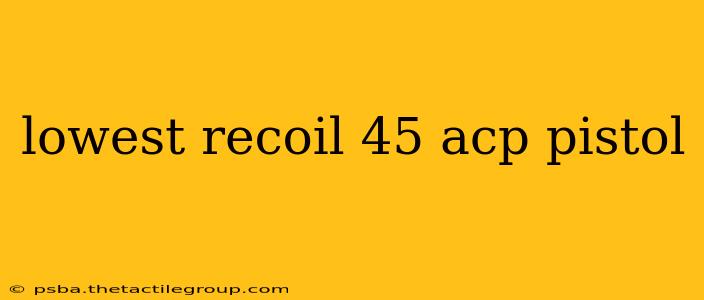Finding the lowest recoil .45 ACP pistol is a quest many shooters undertake, especially those new to the caliber or prioritizing comfortable shooting experiences. The .45 ACP, known for its substantial stopping power, often delivers a noticeable kick. However, several factors beyond just the firearm's design influence felt recoil. This guide will explore pistol characteristics that minimize recoil and highlight models frequently praised for their manageable recoil profiles.
Understanding Recoil in .45 ACP Pistols
Before diving into specific models, understanding the physics behind recoil is crucial. Recoil is the backward force experienced by the shooter after a round is fired. Several factors contribute to the felt recoil:
- Caliber: The .45 ACP, by its nature, has more recoil than smaller calibers. This is due to the bullet's weight and velocity.
- Weight of the Pistol: Heavier pistols generally have less felt recoil because the same force is distributed across a larger mass. Think of it like a bowling ball versus a baseball – the bowling ball is harder to stop.
- Barrel Length: Longer barrels generally reduce recoil due to a longer period of force application.
- Muzzle Brake/Compensator: These attachments redirect propellant gases to counteract the recoil impulse, significantly reducing felt recoil. However, they often add complexity and cost.
- Grip Design: A pistol with a comfortable and well-designed grip allows for better control and reduces the perception of recoil. Features like aggressive texturing, palm swells, and backstraps contribute significantly.
- Ammunition: The type of ammunition used significantly impacts recoil. Different bullet weights and powder charges affect the overall recoil impulse. Lighter-recoiling ammunition is available but may compromise stopping power.
Pistols Often Cited for Lower Recoil
While no .45 ACP pistol eliminates recoil entirely, several models are consistently praised for their manageable recoil characteristics due to their weight and design. It's important to note that individual experiences can vary based on factors like hand size, grip strength, and shooting technique. Always try a pistol before purchasing to ensure a comfortable fit.
Here are some examples of pistols often mentioned in discussions regarding lower .45 ACP recoil:
High-Weight, Full-Size Pistols:
- 1911s (Larger Frame Variants): Many full-size 1911s, particularly those with heavier frames, are known for their relatively manageable recoil due to their weight. The inherent design of the 1911 also contributes to a smoother recoil impulse. Look for models with heavier slides and frames.
Polymer-Framed Pistols:
While often lighter than all-metal counterparts, some polymer-framed .45 ACP pistols are designed to mitigate recoil. Their design may incorporate features like longer slides, heavier slides, or internal weight compensations. Research models and their specific features to find out if it meets your needs.
Consider these factors when choosing:
- Your Experience Level: Beginners often benefit from heavier pistols with lower recoil to build confidence and skills.
- Intended Use: If you need a gun for concealed carry, weight becomes a crucial consideration. A heavier gun may not be the best choice for all-day carry.
- Ergonomics: Handle size, texture, and overall grip comfort are essential factors affecting your perception of recoil.
Conclusion: Finding the Right Fit
Determining the "lowest recoil" .45 ACP pistol is subjective and depends on individual preferences and shooting style. However, by understanding the contributing factors to recoil and considering the characteristics discussed above, you can make an informed decision. Always prioritize safety and proper training when handling firearms. Visit a local gun range to handle and test different models before making your purchase. Remember to consult with experienced shooters and professionals to find the best fit for your needs and experience level.

